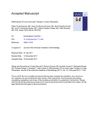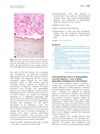 19 citations,
June 2009 in “Seminars in cutaneous medicine and surgery”
19 citations,
June 2009 in “Seminars in cutaneous medicine and surgery” Proper education can prevent traction alopecia in women of color.
 18 citations,
November 2012 in “Australasian Journal of Dermatology”
18 citations,
November 2012 in “Australasian Journal of Dermatology” A 66-year-old man with a rare case of male frontal fibrosing alopecia did not regrow hair despite treatment.
 17 citations,
May 2021 in “Journal of Assisted Reproduction and Genetics”
17 citations,
May 2021 in “Journal of Assisted Reproduction and Genetics” COVID-19 may harm male fertility and damage the reproductive system.
[object Object]  17 citations,
October 2017 in “Journal of Cutaneous Medicine and Surgery”
17 citations,
October 2017 in “Journal of Cutaneous Medicine and Surgery” No treatment has been proven to effectively stop hair loss or regrow hair in Frontal Fibrosing Alopecia, and more research is needed.
 17 citations,
August 2015 in “Expert Opinion on Pharmacotherapy”
17 citations,
August 2015 in “Expert Opinion on Pharmacotherapy” The document concludes that oral finasteride and topical minoxidil are effective for genetic hair loss, while other treatments for different types of hair loss show promise but need more research.
 16 citations,
December 2020 in “International Journal of Clinical Practice”
16 citations,
December 2020 in “International Journal of Clinical Practice” The pandemic changed how often certain skin conditions were diagnosed.
 16 citations,
May 2019 in “International Journal of Women's Dermatology”
16 citations,
May 2019 in “International Journal of Women's Dermatology” The new FDA labeling rules provide more detailed drug safety information for pregnant and breastfeeding women, but more data is needed on the risks of many dermatologic drugs.
 16 citations,
January 2019 in “Neuropsychobiology”
16 citations,
January 2019 in “Neuropsychobiology” People with Lichen Planopilaris tend to be more depressed, have lower self-esteem, and a worse quality of life.
 16 citations,
December 2017 in “Journal of The American Academy of Dermatology”
16 citations,
December 2017 in “Journal of The American Academy of Dermatology” Low-level laser therapy may reduce symptoms and increase hair thickness in lichen planopilaris patients.
 16 citations,
January 2017 in “Anais brasileiros de dermatologia/Anais Brasileiros de Dermatologia”
16 citations,
January 2017 in “Anais brasileiros de dermatologia/Anais Brasileiros de Dermatologia” Managing frontal fibrosing alopecia and lichen planus pigmentosus is challenging due to resistant hair loss and skin discoloration.
 16 citations,
June 2015 in “Pediatric dermatology”
16 citations,
June 2015 in “Pediatric dermatology” Lichen Planopilaris in teens is rare, often misdiagnosed, and responds well to steroids.
 16 citations,
January 2013 in “Indian Journal of Dermatology, Venereology and Leprology”
16 citations,
January 2013 in “Indian Journal of Dermatology, Venereology and Leprology” New treatments and early diagnosis methods for permanent hair loss due to scar tissue are important for managing its psychological effects.
 16 citations,
August 2011 in “Annals of Allergy Asthma & Immunology”
16 citations,
August 2011 in “Annals of Allergy Asthma & Immunology” A woman with severe angioedema improved significantly after treatment with rituximab.
 16 citations,
January 2007 in “Actas dermo-sifiliográficas/Actas dermo-sifiliográficas”
16 citations,
January 2007 in “Actas dermo-sifiliográficas/Actas dermo-sifiliográficas” The document concludes that there are no reliable treatments for frontal fibrosing alopecia, with only temporary benefits from current options.
 15 citations,
August 2021 in “Reviews in endocrine and metabolic disorders”
15 citations,
August 2021 in “Reviews in endocrine and metabolic disorders” COVID-19 and hypopituitarism (reduced pituitary gland function) are linked, with the latter's related health issues potentially worsening COVID-19 outcomes, and COVID-19 possibly increasing risk for pituitary complications.
[object Object]  15 citations,
March 2021 in “Journal of clinical medicine”
15 citations,
March 2021 in “Journal of clinical medicine” Biologic treatments for Crohn's disease and ulcerative colitis can cause skin problems, and doctors should adjust treatment if these occur.
 15 citations,
December 2020 in “Pharmacology Research & Perspectives”
15 citations,
December 2020 in “Pharmacology Research & Perspectives” Blocking enzymes that help the virus enter cells could be a promising way to treat COVID-19.
 15 citations,
April 2020 in “Journal of The American Academy of Dermatology”
15 citations,
April 2020 in “Journal of The American Academy of Dermatology” Oral minoxidil can increase or maintain hair thickness in most people with lichen planopilaris, with mild side effects.
 15 citations,
January 2019 in “International Journal of Women's Dermatology”
15 citations,
January 2019 in “International Journal of Women's Dermatology” Early treatment helps stop hair loss in women of color.
 15 citations,
September 2014 in “Journal of The American Academy of Dermatology”
15 citations,
September 2014 in “Journal of The American Academy of Dermatology” Seven patients were misdiagnosed with discoid lupus instead of lichen planopilaris due to similar symptoms, showing the need for careful diagnosis in scarring hair loss conditions.
 15 citations,
July 2002 in “Australasian Journal of Dermatology”
15 citations,
July 2002 in “Australasian Journal of Dermatology” Two plywood factory workers developed contact dermatitis from phenol-formaldehyde resin, a known allergen.
 14 citations,
August 2018 in “Frontiers in Cellular and Infection Microbiology”
14 citations,
August 2018 in “Frontiers in Cellular and Infection Microbiology” Dengue virus can infect human hair follicle cells and may cause hair loss.
 13 citations,
August 2020 in “Mayo Clinic proceedings”
13 citations,
August 2020 in “Mayo Clinic proceedings” Women with lichen planopilaris often have thyroid disease, depression, anxiety, and may respond to treatment with slowed disease progression.
 13 citations,
March 2019 in “Pharmacology Research & Perspectives”
13 citations,
March 2019 in “Pharmacology Research & Perspectives” In Singapore, most skin reactions to drugs were in females and Chinese, often caused by painkillers, antibiotics, and some other drugs, with serious cases linked to genetics.
 12 citations,
June 2020 in “Journal of The American Academy of Dermatology”
12 citations,
June 2020 in “Journal of The American Academy of Dermatology” Platelet-rich plasma is tolerable for lichen planopilaris and doesn't worsen the condition, but its effectiveness is unclear.
 12 citations,
March 2020 in “Journal of Bioactive and Compatible Polymers”
12 citations,
March 2020 in “Journal of Bioactive and Compatible Polymers” Nanoparticles show potential for controlled release of hair loss drugs, improving treatment effectiveness.
 12 citations,
October 2016 in “Anais Brasileiros de Dermatologia”
12 citations,
October 2016 in “Anais Brasileiros de Dermatologia” Frontal Fibrosing Alopecia may be linked to autoimmune diseases like Sjögren's syndrome.
 12 citations,
November 2014 in “Journal of Cutaneous Medicine and Surgery”
12 citations,
November 2014 in “Journal of Cutaneous Medicine and Surgery” Antiviral medication valganciclovir may improve skin and hair in Trichodysplasia Spinulosa patients.
 11 citations,
May 2021 in “Dermatologic clinics”
11 citations,
May 2021 in “Dermatologic clinics” PRP and cell therapies may help with hair loss, but more research is needed.
 11 citations,
April 2020 in “Journal of Dermatological Treatment”
11 citations,
April 2020 in “Journal of Dermatological Treatment” Taking oral isotretinoin with creams worked better for treating a type of hair loss than creams alone.






























